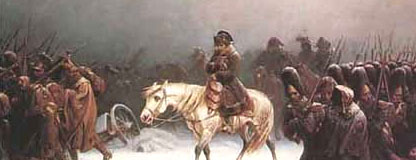ADVERTISEMENT
|
|
|
Russia Travel & Tourism Guide
Russia History - Imperial Russia
NextGen Day feature Australia links, Australia resources and large selection of Australia budget airlines, Australia chartered planes, Australia sea cruises, Australia ferries, Australia travel agencies, Australia land transports and Australia attractions including Australia beaches, Australia medical tourism, Australia retirement homes, Australia historical and Australia pilgrimage tours. NextGen Day offers travel tips and information for top travel places and best destinations in Africa, Asia, Australia, Europe, Middle East and United States of America.

Napoleon's retreat from Moscow
Under the Romanov dynasty and Peter I (Peter the Great), the Russian Empire became a world power. Ruling from 1682 to 1725, Peter defeated Sweden in the Great Northern War, forcing it to cede West Karelia and Ingria (two regions lost by Russia in the Time of Troubles), Estland, and Livland, securing Russia's access to the sea and sea trade. It was in Ingria that Peter founded a new capital, Saint Petersburg. Peter's reforms brought considerable Western European cultural influences to Russia. Catherine II (Catherine the Great), who ruled from 1762 to 1796, continued the efforts to establish Russia as one of the Great Powers of Europe. In alliance with Prussia and Austria, Russia stood against Napoleon's France and eliminated its rival Poland-Lithuania in a series of partitions, gaining large areas of territory in the west. As a result of its victories in the Russo-Turkish War, by the early 19th century Russia had made significant territorial gains in Transcaucasia. Napoleon's invasion of Russia at the height of his power in 1812 failed miserably as obstinate Russian resistance combined with the bitterly cold Russian winter dealt him a disastrous defeat, in which more than 95% of his invading force perished. The officers in the Napoleonic Wars brought ideas of liberalism back to Russia with them and even attempted to curtail the tsar's powers during the abortive Decembrist revolt of 1825, which was followed by several decades of political repression.
The prevalence of serfdom and the conservative policies of Nicolas I impeded the development of Russia in the mid-nineteenth century. Nicholas's successor Alexander II (1855–1881) enacted significant reforms, including the abolition of serfdom in 1861; these "Great Reforms" spurred industrialization. However, many socio-economic conflicts were aggravated during Alexander III’s reign and under his son, Nicholas II. Harsh conditions in factories created mass support for the revolutionary socialist movement. In January 1905, striking workers peaceably demonstrated for reforms in Saint Petersburg but were fired upon by troops, killing and wounding hundreds. The abject failure of the Tsar's military forces in the initially-popular Russo-Japanese War, and the event known as "Bloody Sunday", ignited the Russian Revolution of 1905. Although the uprising was swiftly put down by the army and although Nicholas II retained much of his power, he was forced to concede major reforms, including granting the freedoms of speech and assembly, the legalization of political parties and the creation of an elected legislative assembly, the Duma; however, the hopes for basic improvements in the lives of industrial workers were unfulfilled. Droughts and famines in Russia tended to occur on a fairly regular basis, with famine occurring every 10–13 years. The 1891-92 famine killed approximately half-million people. Cholera epidemics claimed more than 2 million lives.
Russia entered World War I in aid of its ally Serbia and fought a war across three fronts while isolated from its allies. Russia did not want war but felt that the only alternative was German domination of Europe. Although the army was far from defeated in 1916, the already-existing public distrust of the regime was deepened by the rising costs of war, casualties (Russia suffered the highest number of both military and civilian deaths of the Entente Powers), and tales of corruption and even treason in high places, leading to the outbreak of the Russian Revolution of 1917. A series of uprisings were organized by workers and peasants throughout the country, as well as by soldiers in the Russian army, who were mainly of peasant origin. Many of the uprisings were organized and led by democratically-elected councils called Soviets. The February Revolution overthrew the Russian monarchy, which was replaced by a shaky coalition of political parties that declared itself the Provisional Government. The abdication marked the end of imperial rule in Russia, and Nicholas and his family were imprisoned and later executed during the Civil War. While initially receiving the support of the Soviets, the Provisional Government proved unable to resolve many problems which had led to the February Revolution. The second revolution, the October Revolution, led by Vladimir Lenin, overthrew the Provisional Government and created the world’s first socialist state.
Source : Wikipedia Encyclopedia
Hotels, Vacations & Holidays in Russia, Europe |

